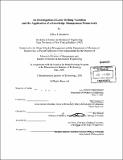An investigation of laser drilling variation and the application of a knowledge management framework
Author(s)
Bornheim, Jeffrey J. (Jeffrey James), 1974-
DownloadFull printable version (9.505Mb)
Other Contributors
Leaders for Manufacturing Program.
Advisor
Daniel Whitney and Roy Welsch.
Terms of use
Metadata
Show full item recordAbstract
Customer requirements for efficiency in the gas turbine industry are driving designs that require increasingly complex and precise manufacturing processes. One such process employed at Alstom Power is the laser drilling holes in gas turbine blades and vanes. The complexity of such advanced manufacturing techniques requires a disciplined approach toward process improvement. In addition, manufacturing knowledge management systems must be put in place to provide the foundation for improvement initiatives. This thesis attempts to advance the understanding of laser-drilling variation sources on gas turbine nickel-based alloy blades and vanes. It also illustrates the importance of a disciplined approach to reducing variation in advanced manufacturing processes. For illustrative purposes, this thesis consists of two main sections. The first focuses on efforts to reduce laser drilling variation. A historical view of the process highlights the need for a rigorous improvement plan. A disciplined approach is then proposed, incorporating a variety of tools to focus on key issues. Finally, testing and analysis provide the quantitative insights for improving the process. Rigorous test data showed the drilling process to be significantly impacted by energy and focus variations. The sensitivity was greater than anticipated and highlights the need for improved setup techniques and instrumentation for successful production runs. The second section of the thesis takes an organizational perspective of managing process improvement knowledge. The historical perspective shows that there were not sufficient systems in place to facilitate the necessary learning. The three key elements of a knowledge management system (creation, capture, and transfer) and the implementation of such a system are discussed.
Description
Thesis (S.M.)--Massachusetts Institute of Technology, Dept. of Mechanical Engineering; and, (M.B.A.)--Massachusetts Institute of Technology, Sloan School of Management; in conjunction with the Leaders for Manufacturing Program at MIT, 2001. Includes bibliographical references (p. 57-59).
Date issued
2001Department
Leaders for Manufacturing Program at MIT; Massachusetts Institute of Technology. Department of Mechanical Engineering; Sloan School of ManagementPublisher
Massachusetts Institute of Technology
Keywords
Mechanical Engineering., Sloan School of Management., Leaders for Manufacturing Program.